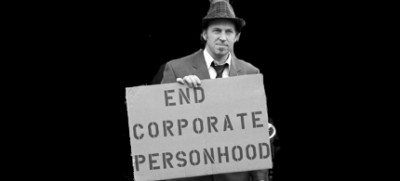Ending the sham of “corporate personhood” may be easier than anyone had previously imagined
By Carl Gibson, Reader Supported NewsIf you knew you could end the concept of corporate personhood at the local level, and that everyone all over the country was doing it too, wouldn’t you try it? All you need is $50 to $100 depending on what state you’re in, a vehicle, and a carpool lane. A briefcase is helpful, but optional.

We all know corporations aren’t people. The mere suggestion that an entity with an unlimited lifespan — that doesn’t eat, sleep, make love, or even have a measurable pulse — is a legitimate “person” is laughable. So here’s an easy way to prove that laughable concept to local law enforcement, and more importantly, your local judge.
Step One: Form Your Own Corporation
It’s incredibly easy to form your own limited liability company, or LLC. Even though an LLC isn’t officially recognized by the IRS, you can classify it as a partnership or an S corp. can walk you through the entire process. All you need to do is go to your local Secretary of State’s office and request incorporation paperwork for your own LLC. The fee is generally $50 to $100 to form your own corporation. You may also need to request an Employer Identification Number from the IRS to make your corporation official. Once your corporation is formed and approved by your Secretary of State’s staff, move on to step two.
Step Two: Drive in the Carpool Lane During Rush Hour
Most major cities have a designated lane for carpools, where vehicles containing two or more people can ride to bypass heavy traffic. This part is where a briefcase will come in handy, to give your corporate “person” some personality. Once your corporation’s paperwork is safely secured in a briefcase, fasten the seatbelt for both yourself and your corporate “person.” Drive in the carpool lane with only yourself and your briefcase in the car. Make sure you signal appropriately, drive the speed limit, don’t drive with any incriminating substances, and abide by all traffic laws. If you’re lucky, you’ll be pulled over by law enforcement.
Step Three: Perplex Local Law Enforcement
When you see those flashing lights in your rearview mirror, signal and pull over. If you have a smartphone or any sort of recording device, turn it on and record your conversation with the officer pulling you over. The cop will most likely give you a ticket for driving solo in the carpool lane. This is where you explain to the officer that you indeed have two people in your vehicle — yourself and your corporation, which the Supreme Court says is a person for all legal purposes. The cop likely won’t buy it, and you’ll be issued a traffic ticket and a court date. Now, don’t fret, because this is a win-win situation for you.
Step Four: Get Out of a Traffic Ticket/Abolish Corporate Personhood
Your court date will likely be at least a month in advance, so you’ll have plenty of time to prepare. Wear professional attire to your court appearance, and make sure you bring your corporate paperwork with you – again, a briefcase would be beneficial here. When you see the judge, explain your situation just as you did with the cop who pulled you over. The cop should be in the courtroom with you, anyway (and if not, you automatically get out of paying your ticket and court costs). The judge has two choices. He can uphold corporate personhood, agree that your corporation is a person and that the two of you can legally ride in the carpool lane. Or, the judge can force you to pay the ticket and the court fees, while laughing at the suggestion that your bundle of paperwork in your briefcase is a living, breathing person.
While the second option would probably cost you at least three figures and increase your insurance premiums, you have the greater victory of a lower court striking down corporate personhood, and simultaneously contradicting both the 2010 Supreme Court ruling as well as the 1886 ruling, which first established the concept of corporations as people.
Imagine if judges in all 50 states abolished corporate personhood in such a way! The Supreme Court wouldn’t dare appeal or ignore the decisions of lower court judges in every state. And all it takes is a little rebellion and devious thinking on our part to get it done.
Carl Gibson, 25, is co-founder of US Uncut, a nationwide creative direct-action movement that mobilized tens of thousands of activists against corporate tax avoidance and budget cuts in the months leading up to the Occupy Wall Street movement. Carl and other US Uncut activists are featured in the documentary “We’re Not Broke,” which premiered at the 2012 Sundance Film Festival. He currently lives in Madison, Wisconsin. You can contact him at [email protected], and follow him on twitter at @uncutCG.
Reader Supported News is the Publication of Origin for this work. Permission to republish is freely granted with credit and a link back to Reader Supported News.
- I Was There When JFK Appeared on ‘The Lead with Jake Tapper’ - July 6, 2025
- The Neanderthal - June 2, 2025
- Oxymoron Harmony - May 27, 2025

